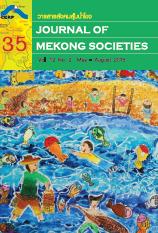Kinship Relations in Weddings and Funerals as a Dimension of Human Security: The Case of Quynh Doi Village, Quynh Luu District, Nghe An Province, Vietnam
Main Article Content
Abstract
Kinship traditionally played a significant key role in Vietnamese village life until the 1945 Revolution; from the 1950s to 1980s, the state tried to shape the family and kinship following its ideology, which led to a weakening of kinship relations. Since the mid-1980s, however, after the government adopted comprehensive socio-economic reforms, there has been a revival in activities involving kinship relations. This article examines the role of kinship relations in everyday village life, especially life-cycle events. By applying a human security perspective, the article shows that since the reforms, kinship relations have been the mainstay for individuals and their families to reduce difficulties or insecurities in organizing life-cycle events such as funerals and weddings at the village level.


